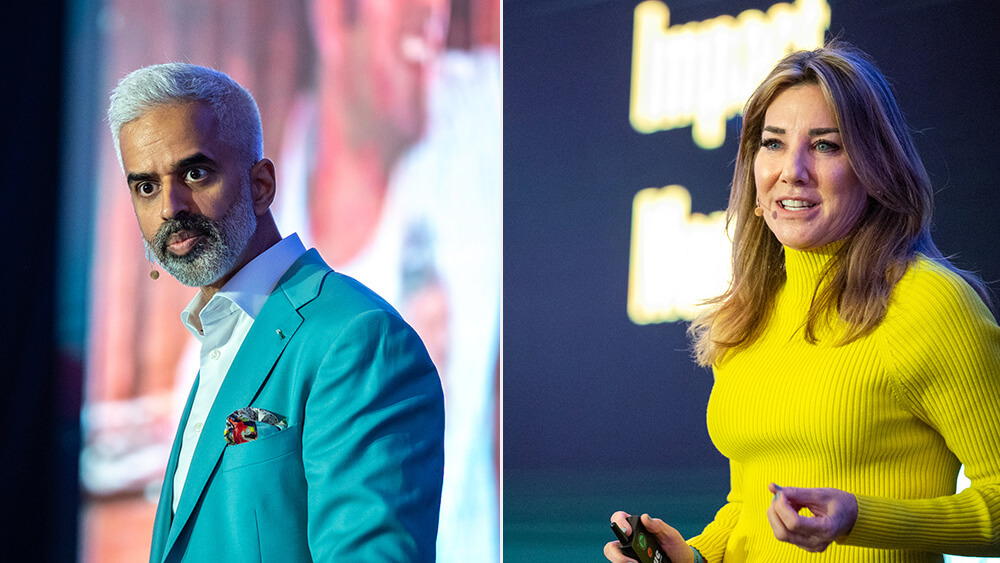
In separate presentations at the PCMA Foundation Partnership Summit 2023, authors Riaz Meghji and Laura Gassner Otting addressed this challenge and offered strategies for enhancing connections and closing the gap between leaders and workers in a hybrid work world. (Marton Ats photos)
Zero work was done on my first day back to the office after the pandemic, where I used to work before I joined Convene. All of us were thirsty for human connection and catching up in person — the focus was on socialization not output. And that was fine. We knew we would catch up on the work once we were back in the comfort of our homes, illuminated by our big screens, in our loungewear, and sipping our own good coffee.
Perhaps we have less of a pent-up need to socialize now that we have been back to being face to face. But splitting our time between WFH and in the office — in our latest Convene Salary Survey, more than 17 out of 20 business event professional respondents said they are hybrid workers — has created a different dynamic that can make managing people more complicated.
In their separate presentations at the PCMA Foundation Partnership Summit 2023, authors Laura Gassner Otting and Riaz Meghji addressed this challenge and offered strategies for enhancing connections and closing the gap between leaders and workers in this hybrid work world that continues to evolve.
For one, the traditional approach of managing by walking around when workers are in the office can feel intrusive for both workers and leaders, Gassner Otting, author of Limitless and Wonderhell, told Convene, prior to her talk in Panama. At the same time, “in an age of ever-increasing loneliness and solitude, our workers are yearning to be seen,” she said.
RELATED: Can We Become Limitless at Work?
The findings from a three-year research project, comprising nearly 6,000 responses from 74 different countries, which Gassner Otting conducted before, during, and after the pandemic, summarized in an HBR article, shows that “even people who rate their leaders as ‘good’ are just as likely to leave if they feel they don’t have much of a relationship with that good leader.”
Her research indicated that nearly three out of every four people “would work harder if they felt that their work matters,” with nine out of 10 people wanting “to be their best selves at work.” However, fewer than one in every three people actually felt that their leaders inspire them to be that person, “or even care that much if they are.”
Meghji, a human connection expert and author of the book Every Conversation Counts: The 5 Habits of Human Connection That Build Extraordinary Relationships, agrees that leaders must prioritize making connections with their teams. To become a good, but also caring leader, one must get curious about both their team’s personal and professional lives, he told Convene.
Likewise, Gassner Otting said that understanding what drives employees, what matters to them, and what they genuinely care about is the way forward. “To do this, leaders need to learn to talk less, and listen more,” she said.
RELATED: How to Make Connections at Events, Work, and in Life
Meghji gets leaders started on this path by asking their team members questions, like:
- How do you like to be recognized? Responses help leaders understand what motivates their employees — financial benefits, public praise, or autonomy.
- What makes you come alive? can help boost their sense of belonging.
- What does meaningful progress look like for you? can provide insight into how they see success and what motivates them.
Such questions should also be part of an organization’s recruitment strategy and the evaluation of potential new hires. Gassner Otting asks candidates to tell her a story “of a time when they were their very best selves.” She said that digging into the details can make it evident when that person “lights up” what inspires them to create meaningful work. She suggests asking in reference checks, as well, what motivates individuals.
The workplace may be a different place, but “judging less and listening more,” Meghji said, may be the best advice for leaders navigating a hybrid staff.
Magdalina Atanassova is digital media editor of Convene.
